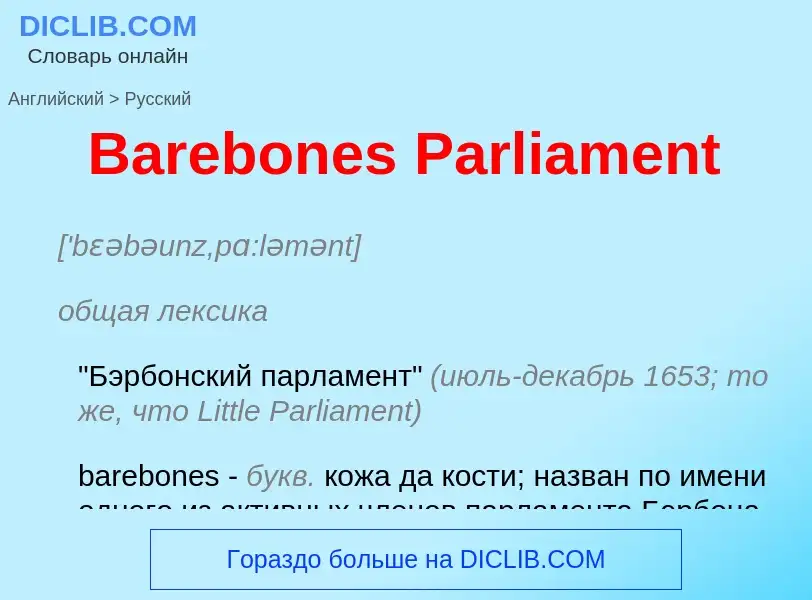Translation and analysis of words by ChatGPT artificial intelligence
On this page you can get a detailed analysis of a word or phrase, produced by the best artificial intelligence technology to date:
- how the word is used
- frequency of use
- it is used more often in oral or written speech
- word translation options
- usage examples (several phrases with translation)
- etymology
Barebones Parliament - translation to English
['bɛəbəunz,pɑ:ləmənt]
общая лексика
"Бэрбонский парламент" (июль-декабрь 1653; то же, что Little Parliament)
barebones - букв. кожа да кости; назван по имени одного из активных членов парламента Бэрбона [Barbon], по прозвищу Бэрбонз [Barebones]
[,lɪtl'pɑ:ləmənt]
общая лексика
"Малый парламент" (существовал с 4 июля по 11 декабря 1653; провёл ряд демократических реформ; с его роспуском была ликвидирована республика и установлен Протекторат [Protectorate]; члены парламента назначались государственным советом [Council of State] по рекомендации религиозных конгрегаций)
синоним
[,lɔŋ'pɑ:ləmənt]
общая лексика
"Долгий парламент" (возглавил борьбу с абсолютизмом во время Английской буржуазной революции [English Revolution], завершившейся установлением республики [Commonwealth]. Был созван в 1640 и разогнан в 1653; с 1648 по 1653 существовал под названием "охвостье" Долгого парламента [Rump Parliament]; был вновь созван в 1659 и затем распущен в 1660)
история
«Долгий парламент»
Долгий парламент
Definition
Wikipedia
Barebone's Parliament, also known as the Little Parliament, the Nominated Assembly and the Parliament of Saints, came into being on 4 July 1653, and was the last attempt of the English Commonwealth to find a stable political form before the installation of Oliver Cromwell as Lord Protector. It was an assembly entirely nominated by Oliver Cromwell and the Army's Council of Officers. It acquired its name from the nominee for the City of London, Praise-God Barebone. The Speaker of the House was Francis Rous. The total number of nominees was 140, 129 from England, five from Scotland and six from Ireland (see the list of MPs).
After conflict and infighting, on 12 December 1653, the members of the assembly voted to dissolve it. It was preceded by the Rump Parliament and succeeded by the First Protectorate Parliament.





![Royalists]] Royalists]]](https://commons.wikimedia.org/wiki/Special:FilePath/Luciuscary.jpg?width=200)
